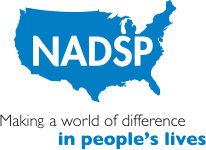
Educate Others As A Competent DSP!
The following article is part of an ongoing series about the NADSP Competency Areas. The NADSP Competency Areas offer DSPs the opportunity to address challenges, work on issues identified by the person they support, or assist a person in pursuing a particular goal. Each Competency Area has corresponding skill statements that describe the knowledge and skills DSPs must have to demonstrate competency in each area.
This blog is about the skill statement “The competent DSP educates participants, co-workers and community members about issues by providing information and support and facilitating training,” within the NADSP Competency Area: “Education, Training & Self-Development.”
Inside The Competency Area
Education, Training & Self-Development
‘Education, Training & Self-Development’ is critical to the professional life of anyone who is in a human services career, especially direct support. The work that direct support professionals do each and every day is complicated and has so many moving parts. Keeping informed about the latest body of knowledge that is associated with aspects of best practices and research in and around disabilities, social policy and health and safety is something we need to take seriously.
In direct support practice there is often required training that is offered. These are good and important. However, excellent and highly competent direct support professionals will request expanded education and training opportunities. They will seek out ways to better understand and improve their direct support practice.
The competent DSP educates participants, co-workers and community members about issues by providing information and support and facilitating training.
Inside The Skill Statement
The competent DSP educates participants, co-workers and community members about issues by providing information and support and facilitating training.
Direct support professionals have numerous training requirements. These are often mandated by the state in which a direct support professional is employed and/or by an agency where the direct support professional works. Often these trainings are associated with health, safety and care and protection.
There is nothing “bad” about such trainings but these are usually annual requirements and are generally always the same content year after year. Direct support professionals have an obligation to keep up-to-date and certified in any training that is a requirement for their position. Another aspect of the skills a direct support professional must embody, consists of sharing their knowledge and experiences with other direct support professionals and colleagues.
The Impact On People Supported
There is nothing better than having a professional in your life who is skilled and knowledgeable about what they do. Whether it is an automobile mechanic or a physician, it is important that the person who we are relying upon knows and is skilled at their craft. For direct support professionals, this is a must.
To share one example, if a direct support professional is working with a person that uses some sort of adaptive, accessible communication device, it is imperative the direct support professional understands the technology that supports it. This may mean that the direct support profession take some classes or receive extended training in the use and application of said device or technology.
Putting It All Into Practice
Many direct support professionals work in the context of teams and groups. In any one team, there may be a wide range of experience. Some direct support professionals may have decades of knowledge and experience, and be very skilled. Other team members may be relatively new and just beginning to learn about the profession. Either way, there is much to be learned from one another.
For instance, when a direct support professional has been employed for a long time, supporting specific people over that long stretch, they will undoubtedly have accumulated the knowledge and history of the people they support. This is valuable for other direct support professionals who will be engaged with these same people. The “experienced” (veteran) direct support professional has an obligation – and must be skilled – in sharing and teaching other colleagues about what is important to know when supporting the people for whom they may know a considerable amount of information.
Furthermore, direct support professionals should expand their knowledge and seek out supports and education in and around anything that may present challenges. This could include the realm of the support needs of, and for, the people with whom they serve. In addition, it is a supervisor’s responsibility to monitor the educational and training needs of direct support staff as well.
Quick Tips
How can you help embrace this skill statement and implement it? Here are some quick tips!
-
- Keep a record and journal of your mandated training
- Ensure that your personnel file has up to date required training documentation
- Keep up-to-date on possible educational opportunities for your benefit
- Request training, and expanded training, for anything that you may need for your professional education or improvement
- Request to attend professional conferences and events where you can network and learn
NADSP Competency Areas
The NADSP Competency Areas offer DSPs the opportunity to address challenges, work on issues identified by the person they support, or assist someone in pursuing a goal.
You May Also Be Interested In …

Let’s Talk: Embracing Diversity Equity and Inclusion: A Pathway to Professional Excellence for DSPs

Let’s Talk: Burnout: Reclaiming Mental Wellness in Direct Support Work

Let’s Talk: Flipping the Switch: Compassion Fatigue to Compassion Satisfaction and Psychological Safety for Direct Support Professionals

Let’s Talk: Sexuality and Healthy Relationship Knowledge is Power

Let’s Talk: Balancing Joy, Boundaries, and Belonging: The Ethical Role of DSPs in Holiday Celebration and Connection

Webinar: The Future of COVID-19 and Vaccines

International Journal: A Deep Dive Into The NADSP Code Of Ethics

International Journal: Ethics For Direct Support Professionals

